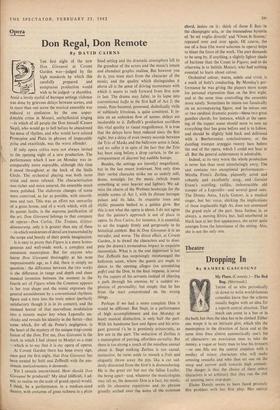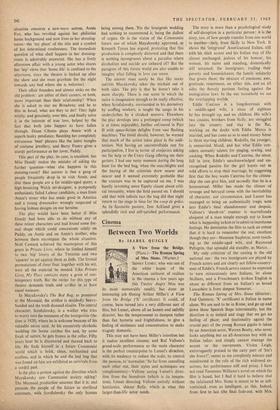Theatre
Dropping In
By BANIBER GASCOIGNE
My Place. (Comedy.) —The Bed Bug. (Mermaid.) THOSE of us who periodically sit down to write world-famous comedies know that the scheme usually begins with an idea for a superb central situation. That much can come in a bus or in the bath, but then the idea has to be clothed. Either one wraps it in an intricate plot, which tilts the masterpiece in the direction of farce and at the same time fixes almost automatically one's list of characters—an avaricious man to take the money, a vague or hasty man to lose his trousers —or one fills out the central situation with a medley of minor characters who will make amusing remarks and who thus set one on the steep and narrow path towards high comedy. The danger is that the choice of these minor characters is so arbitrary that they run the risk of seeming mere stop-gaps.
Elaine Dundy seems to have faced precisely this problem with her first play. Her central situation concerns a new-wave actress, Annie Fox, who has revolted against her philistine home background and now lives in her dressing- room—the 'my place' of the title and a symbol of her determined rootlessness. The immediate question of what shall happen in her dressing- .room is admirably answered. She has a lively afternoon affair with a young actor who shares her 'hip' views (her 'home life' is confined to the afternoon, since the theatre is locked up after the show and she must gravitate for the night towards any bed where she is welcome).
Their affair founders and almost sinks on the old problem : are either of their careers, or both, more important than their relationship? When she is asked to star on Broadway and he to film in Israel, what are they to do? They fight wittily, and genuinely, over this, and finally solve it in the interests of true love, helped by the fact that both jobs happen to have fallen through. Diane Cilento plays Annie with a superb husky petulance, flaunting her completely extraneous 'beat' phrases like the latest bangles of costume jewellery, and Barry Foster gives a sturdy performance as her lover, Paddy.
This part of the play, its core, is excellent, but Miss Dundy makes the mistake of asking the further question—what else happens in this dressing-room? Her answer is that a gang of people frequently drop in to visit Annie, and that these people are a fat middle-aged queer, a high-bouncing Welsh set-designer, a pompously enthusiastic failed Labour candidate, a man from Annie's street who has made good in America and a young dressmaker wrongly suspected of having lesbian designs on our heroine.
The play would have been better if Miss Dundy had been able to do without any of these minor characters and had found some for- mal shape which could concentrate solely on Paddy, on Annie and on Annie's mother, who between them encompass the whole situation. Noel Coward achieved the masterpiece of this genre in Private Lives, where he limited himself to two 'hip' lovers of the Twenties and two `squares' to set against them as foils. The formal permutations of these four, together with his wit, were all the material he needed. Like Private Lives, My Place contains many a grain of con- temporary truth. But the recipe for this type of theatre demands truth and artifice in at least equal measure.
In Mayakovsky's The Bed Bug, as presented at the Mermaid, the artifice is decidedly heavy- handed and the truth damned elusive. The central character, Scrofulovsky, is a worker who tries to marry into the remnants of the bourgeoisie (the time is 1928), where he is welcome because of his valuable union card. At his excessively alcoholic wedding the house catches fire and, by some freak of nature, he gets frozen in the cellar. Fifty years later he is discovered and thawed back to life. He finds himself in a future Communist world which is brisk, clean, mechanised and soulless,, and in which he and the bed bug that was found on him are exhibited as survivals from a sordid, past.
Is the play a protest against the direction which Mayakovsky saw Communist society taking? The Mermaid production assumes that it is, and presents the people of the future as sterilised automata, with Scrofulovsky the only human being among them.. Yet the bourgeois wedding had nothing to recommend it, being the dullest of orgies. Or is the vision of the Communist future one of which Mayakovsky approved, as Kenneth Tynan has argued, protesting that this production is completely distorted and that there is nothing incongruous about a paradise where alcoholism and suicide are unheard of? But the paragons of this future world are also unable to imagine what falling in love can mean.
The answer must surely be that like many satirists Mayakovsky takes the micha.el out of both sides. The pity is that he doesn't take it more sharply. There is one scene in which the satire is imaginative enough to be really effective, when Scrofulovsky, surrounded in his dormitory by scoffing workers, is taught the tango in his underclothes by a cloaked maestro. Elsewhere the play develops into a prolonged romp (which is at times enjoyable), further enlivened in Part 11 with space-fiction delights from vast flashing machines. The timid should, however, be warned that much of the action takes place in the audi- torium. Not having an uncontrollable zest for participation, I live in terror of conjurors asking me for help or the Crazy Gang offering me their garters. I had one nasty moment during the long hunt for the bed bug, when the searchlights and the baying of the scientists drew nearer and nearer and it seemed extremely probable that the creature was to be captured on me. I was hastily inventing some Equity clause about criti- cal immunity, when the field passed on. I should add that with infinite tact the bug did that night return to the stage in time for the coup de grace. As its favourite pasture, Joss Ackland gives a splendidly rich and self-satisfied performance.



































 Previous page
Previous page